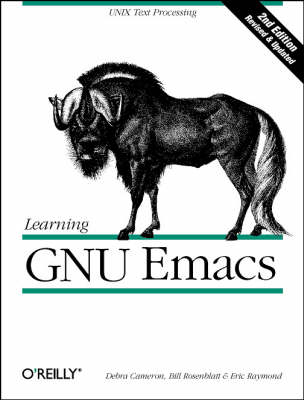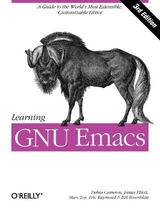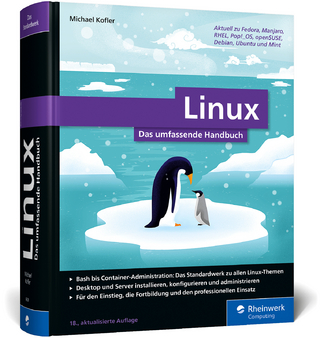
Learning GNU Emacs
O'Reilly Media (Verlag)
978-1-56592-152-8 (ISBN)
- Titel erscheint in neuer Auflage
- Artikel merken
An introduction to Version 19.29 of the GNU Emacs editor, one of the editors available under UNIX. This text provides an introduction to basic editing, a look at several important "editing modes" (special Emacs features for editing specific types of documents, including email, Usenet News, and the World Wide Web), and a brief introduction to customization and Emacs LISP programming. The book is aimed at new Emacs users, whether or not they are programmers. The book also includes a quick-reference card.
Debra Cameron is a freelance writer who has written books on the Internet, the World Wide Web, UNIX standards, and security. In addition to writing, Deb speaks at conferences and teaches classes. She was keynote speaker of the 1996 WebAware Ireland conference in Dublin. She enjoys proselytizing vi users and convincing them that Emacs is not just an editor, it's a way of life. Deb enjoys bike riding, savoring chocolate, and reading mindless detective fiction as well as children's literature. Deb lives with her husband Jim and children Megan and David in Bellefonte, PA. You can write to her at deb@ora.com. Bill Rosenblatt is a native of Philadelphia. He is director of publishing systems at the Times Mirror Company in New York City and a contributing editor of Advanced Systems magazine. He received a B.S.E. from Princeton University, and an M.S. and A.B.D. from the University of Massachusetts at Amherst, each in some variant of Computer Science. His interests in the computing field include software engineering, object-oriented systems, databases, and programming language theory. Outside of the computing field, he's interested in jazz, classical music, antique maps, and Sherlock Holmes pastiche novels. Bill lives on the Upper West Side of Manhattan. He wishes his landlord allowed pets so that he could truthfully claim to have a dog and cat with suitably droll names like "Coltrane" and "Ravel."
Preface. Chapter 1. Emacs Basics Introducing Emacs! Understanding Files and Buffers A Word About Modes Starting Emacs About the Emacs Screen Emacs Commands Opening a File Saving Files Leaving Emacs Getting Help Summary. Chapter 2. Editing Files Moving the Cursor Deleting Text Marking Text to Delete, Move, or Copy Reformatting Paragraphs Editing Tricks and Shortcuts Stopping Commands and Undoing Changes Making Emacs Work the Way You Want. Chapter 3. Search and Replace Operations Different Kinds of Searches Search and Replace Checking Spelling Word Abbreviation Mode. Chapter 4. Using Buffers and Windows Files, Buffers, and Windows Working with Multiple Buffers Working with Windows Holding Your Place with Bookmarks Temporarily Suspending Emacs Using Multiple X Windows. Chapter 5. Emacs as a Work Environment Executing UNIX Commands in Shell Buffers Working with Files and Directories Printing from Emacs Reading Manpages in Emacs Using Time Management Tools Using Your Emacs Work Environment. Chapter 6. Email and Usenet News Working with Mail Sending Mail from Within Emacs Reading Mail from Within Emacs Reading Usenet News with Gnus. Chapter 7. Emacs as an Internet Toolkit Using Telnet Mode Using Ange-ftp Mode Browsing the Web with W3. Chapter 8. Simple Text Formatting and Specialized Editing Indenting Text Centering Text Inserting Page Breaks Rectangle Editing Making Simple Drawings Using Outline Mode. Chapter 9. Marking up Text with Emacs Marking up Text for troff and nroff Marking up Text for TeX and LaTeX Writing HTML Using Html-helper Mode. Chapter 10. Writing Macros What Is a Macro? Defining a Macro Adding to an Existing Macro Naming and Saving Your Macros Executing a Named Macro Building More Complicated Macros Beyond Macros. Chapter 11. Customizing Emacs Keyboard Customization Terminal Support Emacs Variables Emacs LISP Packages Auto-Mode Customization. Chapter 12. Emacs for Programmers Language Modes C and C++ Modes The LISP Modes FORTRAN Mode Compiling Programs. Chapter 13. Emacs LISP Programming Introduction to LISP LISP Primitive Functions Useful Built-In Emacs Functions Programming a Major Mode Customizing Existing Modes Building Your Own LISP Library. Chapter 14. Emacs and X User-Interface Features Using Emacs with X Fonts and Colors X Display Customizations Customizing via Your .Xdefaults File Properties, Frames, Menus, and Mouse Events Communicating with the X Server A Note on Good X Programming Style. Chapter 15. Version Control Under Emacs The Uses of Version Control Version Control Concepts How VC Helps with Basic Operations Editing Comment Buffers VC Command Summary VC Mode Indicators Which Version Control System? Individual VC Commands Customizing VC Extending VC What VC Is Not Using VC Effectively. Chapter 16. Online Help Completion Help Commands Help in Complex Emacs Commands Appendix A. How to Get Emacs Appendix B. Making Emacs Work the Way You Think It Should. Appendix C. Emacs Variables. Appendix D. Emacs LISP Packages Appendix E. Bugs and Bug Fixes. Appendix F. Public Statements Appendix G. Give and It Shall Be Given. Appendix H. Quick Reference. Glossary. Index
| Erscheint lt. Verlag | 8.10.1996 |
|---|---|
| Reihe/Serie | A Nutshell handbook |
| Zusatzinfo | illustrations |
| Verlagsort | Sebastopol |
| Sprache | englisch |
| Maße | 179 x 231 mm |
| Gewicht | 880 g |
| Einbandart | kartoniert |
| Themenwelt | Informatik ► Betriebssysteme / Server ► Unix / Linux |
| Informatik ► Netzwerke ► Mail Server | |
| ISBN-10 | 1-56592-152-6 / 1565921526 |
| ISBN-13 | 978-1-56592-152-8 / 9781565921528 |
| Zustand | Neuware |
| Haben Sie eine Frage zum Produkt? |
aus dem Bereich



